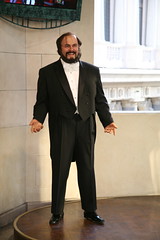By Janga
Avoid the verb “to be.”
Too often I see that command given as well-intentioned advice to some writer who takes the advice literally and begins revising her prose with the goal of eliminating every pesky is/are/was/were from her prose. I’m fairly certain that the advice giver intends to caution the writer against overuse of the verb “to be” and verbs of passive voice, but the warning lacks clarity. A surprising number of people fail to distinguish between “to be” as a state-of-being verb (Jenny is happy) and “to be” as an auxiliary verb used to turn active voice verbs (Jeremy kissed Jenny) into passive voice (Jenny was kissed by Jeremy).
I take every opportunity to make the distinction and to sound the alarm: “to be” is not the writer’s enemy. Yes, even a quick read of many manuscripts reveals that the author has used “to be” excessively, resulting in passages of heavy, dull prose. Few of us who read contest entries have been spared the awkward, confusing sentences created by passive voice. But linking verbs and passive voice are tools the writer needs. Both have their uses. I’d hate to have a character ask “What name do you claim?” rather than “Who are you?”
Take a look at the following passage from Julia Ross’s historical romance The Seduction:
His hair was tied neatly at the back of his neck, but it rippled at the temples where a more elaborate style had been brushed out. The blond waves framed skin with the fashionable pallor of London, enhanced by a small patch high on one cheekbone. Arrogance was reflected in every line of his body, enhanced, not hidden, by the full-skirted riding coat, the tall boots, the fall of white linen at his throat.
A town gentleman, dressed for the country.
His moment of surprised admiration had been masked quickly enough, but it had been there. She had suffered from it all her life. It was the way men always looked at her, as if she were fruit, and ripe, and ready for plucking. Even after she suppressed her moment of panic, it still filled her with fury.
Ross uses four passive voice verbs (“was tied,” “had been brushed out,” “was reflected,” and “had been masked”) and three linking verbs (“had been,” “was,” and “were”) in this brief selection. We can rewrite Ross’s sentences to eliminate the “problem” verbs.
Someone had tied his hair neatly at the back of his neck, but it rippled at the temples where a more elaborate style had been brushed out. The blond waves framed skin with the fashionable pallor of London, enhanced by a small patch high on one cheekbone. Every line of his body reflected arrogance, enhanced, not hidden, by the full-skirted riding coat, the tall boots, the fall of white linen at his throat.
A town gentleman, dressed for the country.
He had masked his moment of surprised admiration quickly enough, but she had seen it there. She had suffered from it all her life. Men always looked at her that way, looked at her like fruit, and ripe, and ready for plucking. Even after she suppressed her moment of panic, it still filled her with fury.
But look at what is lost in the change. First, the rhythm of the prose changes, as does the voice. Moreover, meaning is altered in subtle ways. Does the reader care who ties his hair? I don’t think so, but there is “someone” in a position of strong emphasis. The arrogance of the character is key, but the revision buries the quality in the sentence. And the force of the heroine’s being the object of male gazes is muted in the rewrite.
Ross is a gifted stylist, and she knows how to use action verbs when she needs them. Note this passage from the same chapter as the first selection—every verb but one expresses action:
Her fingers felt clumsy and heavy as she unbuttoned the front of his waistcoat, then opened his shirt at the neck. The strong skin of his throat gleamed smooth and white in the mottled light. She noticed the perfect shape of his jaw at the strangely vulnerable junction where it curved up into his ear and felt a small surge of discomfort, as if she were a young farm girl winked at by a gentleman.
Try this exercise with a writer whose style you admire. My guess is that you will discover the writer uses her full arsenal of verbs.
About the author
Janga started reading her mother’s romance novels the summer she turned ten and has continued to be an avid reader of romance. Even a Ph. D. in English and years in academia were not enough to diminish her love of the genre. The enthusiasm of aspiring romance writers on the Eloisa James bulletin board refired her dream of writing a romance novel. She is in the process of revising her first mss, The Long Way Home, a contemporary with a Southern accent. She blogs at Romance Vagabonds and Just Janga.
“Can we go inside?”

